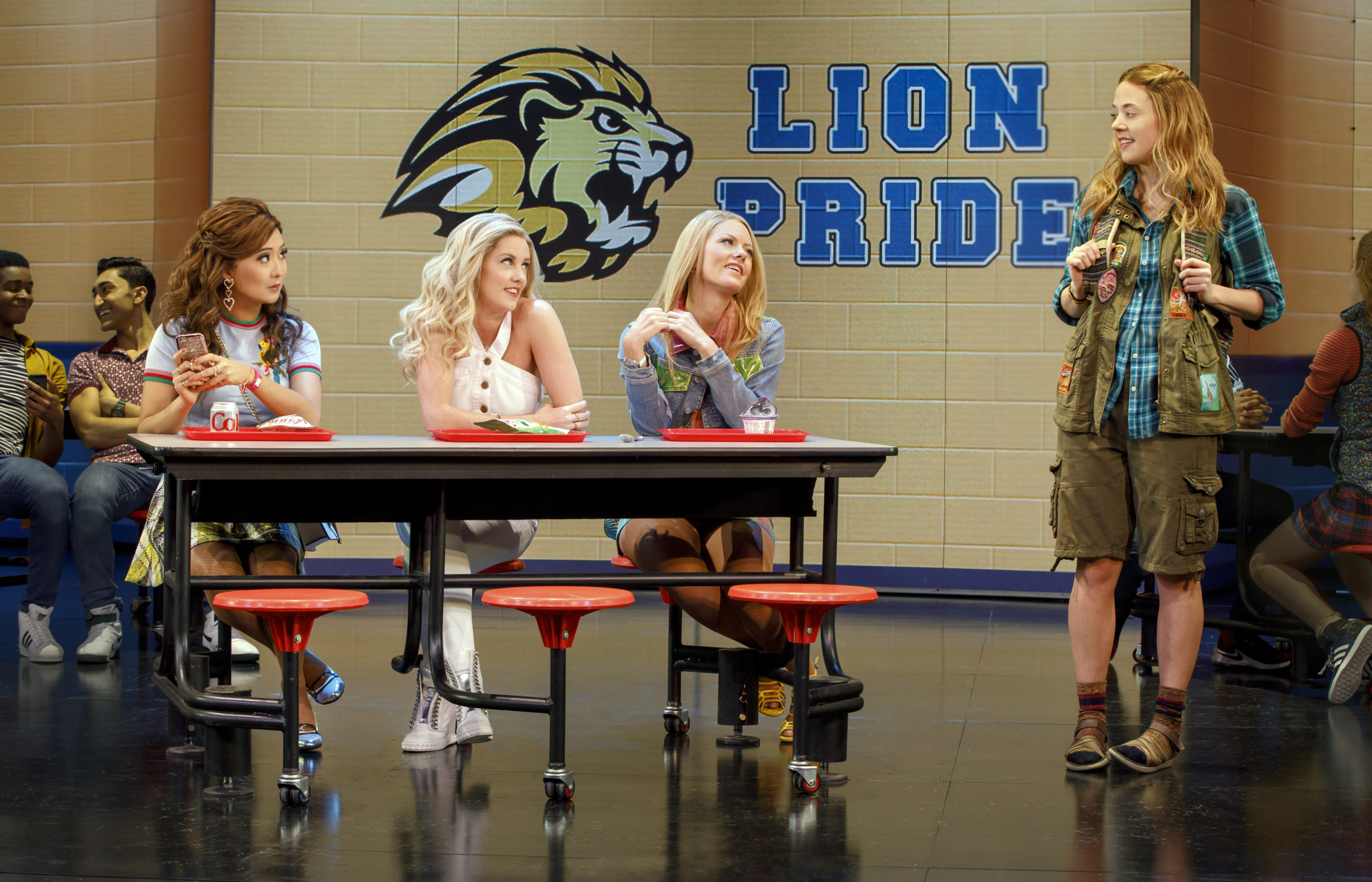
How Feminist is the “Mean Girls” Musical, Really?
Cady Heron (engagingly played by Erika Henningsen, in the role Lindsay Lohan had in the movie) is the character central to the plot, a girl who was home-schooled by her biologist parents in Kenya before returning to the United States and learning how to navigate in a large Illinois high school. But she is not as mesmerizing as Regina George (Taylor Louderman), the regal queen of the Plastics ruling clique. Nor is Cady as endearing as Regina’s sidekick Karen Smith (Kate Rockwell), a comically stupid girl (and why are we laughing at that—though Fey’s writing and Rockwell’s acting disarm us). Nor is she as touchingly insecure as another sidekick, Gretchen Wieners (Ashley Park), the Plastics member whose signature song is a plaintive “What’s Wrong With Me?”
Gretchen delivers Fey’s most piercing up-to-date line, in which she compares herself to a cell phone without a case: “Like I know I’m worth a lot, and I have a lot of good functions, but at any time I could just shatter.” Gretchen also takes a stab at trying to explain feminism: “Ex-boyfriends are off limits to friends. That’s just, like, the rules of feminism.”
On the other hand, we are invited to laugh gleefully at queen-bee Regina’s fall from grace because of a temporary weight gain, indicated by obviously fake stuffing that rounds out her usually tiny buttocks and only makes her look normal-sized. It’s easy enough to titter because this seductively amusing show, directed and choreographed by Casey Nicholaw, swirls with kinetic movement, rapidly shifting background projections and beating rhythms.
The action is framed by the wise counsel of two misfits who introduce the show to the audience and take on the job of guiding Cady through the jungle-like environment of an American high school. Janis Sarkisian (Barrett Wilbert Weed) aggressively stomps her way through the school and pursues her own ragged-edged punk look. Others accuse her (that is the way it’s presented) of being a lesbian. Her best friend, Damian Hubbard (Grey Henson), is openly, flamboyantly gay.
I’m sure I wasn’t the only adult in the audience whose mind wandered back to my own high school days, and how they stack up against this portrayal of high school today—which, judging from the approving reaction of the heavily teenage-female audience, and a few casual conversations about hair and weight-gain that I overheard at intermission, is not far off the mark. Short skirts and high heels were not in evidence, however, at a Saturday matinee. That doesn’t seem to be part of New York daytime style at least.
At my school in the 1960s, no one would have dared to suggest, by mannerisms or anything else, that they might be gay. So there is welcome progress on that front.
Also, this high school is far more diverse than mine was, though ethnic and religious differences are not addressed in the musical, where cliques (band members, math nerds, jocks) appear to be the only dividing lines.
My Atlanta high school, where football players and cheerleaders ruled, was not racially integrated when I attended. But there were minorities—notably the eight Jews in my class of about 200 students. I didn’t experience any overt anti-Semitism from other students, but I often felt excluded in ways most of my classmates never realized.
The other Jews and I (and the few Catholics in my class, another minority) didn’t feel we could join the Student Christian Fellowship, one of the most powerful official groups on campus. A curious Catholic friend and I attended a meeting once, to see what it was like, and we weren’t singled out or turned away. We just felt very uncomfortable. I imagine religious, ethnic and other differences still have a lot of hidden force in high schools today, as they do in adult society.
The discomfort Jews felt at my school went even deeper: A daily prayer was delivered over the intercom every morning by a student, and most ended with “in Christ’s name we pray” or some variation. A Jewish friend of mine volunteered to deliver the prayer one day, and ended with “in Jesus’ name we pray” or perhaps it was a more ambiguous “in his name we pray.” I understood her desire to gain a little acceptance, to fit in.
Where I felt an urge to fit in was in clothing and hairstyle. I owned a Gant shirt and a madras blouse and wore a bouffant hairdo. Short skirts, or anything sexy, were not options in those days. But I did wear short skirts when I was in my 20s—and an avowed feminist.
Which brings me to a realization I made as I thought more about the lessons of “Mean Girls.” There is still, for most of us, a disconnect between the values we espouse and the way we live our lives. I espouse equality and try to be mindful of the implications of words I use or actions I take. I never hid my intelligence to get a guy’s interest, but I do know that, as one character in “Mean Girls” says, “It works.” And, hey, I still care a lot about what my hair looks like and whether my clothes are fashionable, in ways most men don’t. And so do the vast majority of the most powerful and admirable women in America. As one of the song lyrics incisively declares: “This is modern feminism talkin’: I expect to run the world in shoes I can’t walk in.”
It’s not just this musical that sends mixed signals. It’s life.
Progress is hard to gauge.
The views and opinions expressed in this article are the author’s own and do not necessarily reflect those of Lilith Magazine.



